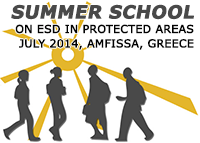|
|||||
| |
|
Home Partners Designated areas & BRs The course Trainers Presentations Students' Essays - TOOLKIT - Recommendations for Nagoya Participants Agenda Report Students' Info Practical Info The host venue Funds Contact us |
WELCOME MESSAGE FROM THE CHAIRMAN OF THE HELLENIC NATIONAL COMMISSION FOR UNESCO (pdf) Report (pdf)Photos
|
Report for the Summer School on Education for Sustainable Development (ESD) in Biosphere Reserves and other Protected Areas An ERASMUS Intensive Program (IP) on Education for Sustainable Development (ESD) in Protected Areas took place in July 2014 with the participation of 8 Universities under the coordination of the University of Athens. Under this program, a 14-days Summer School for ESD in Protected Areas and Biosphere Reserves was held successfully in Amfissa’s Environmental Education Centre (www.kpeamfissas.edu.gr). The Summer School directed by Prof. M.Scoullos ,was jointly organized by the UNESCO Chair and Network on sustainable development management and education in the Mediterranean - the University of Athens and the MEdIES of MIO-ECSDE (Mediterranean Information Office for Environment ,Culture and Sustainable Development ) with the support, apart from EU/ERASMUS, of the UNESCO Regional Bureau for Science and Culture in Europe, Venice (Italy). The workshop was under the auspices of the Hellenic National Commission for UNESCO and its National Committee of MAB/UNESCO. Erasmus Program Dates: 01/09/2013 - 31/08/2014 /Course Dates: 6-19 July 2014 This Summer School provided a high quality intensive training on Education for Sustainable Development (ESD) in various types of designated areas such as Biosphere Reserves, National Parks, Natura 2000 sites, etc to thirty nine (39) trainees. Out of them, twenty six (26) were post-graduate students from Croatia, France, Greece, Italy, Slovenia and Turkey, supported by ERASMUS, three (3) were post-graduate students from Turkey, self-supported, and ten (10) young experts nominated by their MAB National Committees, already involved in educational activities in Biosphere Reserves, coming from Bulgaria, France, Greece, Montenegro, Russian Federation, Spain and the Former Yugoslav Republic of Macedonia, supported by UNESCO/Venice Office. The participating 8 Universities were members of the wider “Network of the Mediterranean Universities for Sustainable Development (SD) focusing on Education for Sustainable Development” including the : The course ultimately promoted designated areas and especially UNESCO/ MAB Biosphere Reserves as "learning laboratories", ideal for applying education for sustainable development. The course was based, to a large extend, on the UNESCO/ MIO-ECSDE/UoA publication entitled "Education for Sustainable Development in Biospheres Reserves and other Designated Areas: A Resource Book for Educators in South-Eastern Europe and the Mediterranean" (http://unesdoc.unesco.org/images/0021/002199/219946e.pdf ) that has been developed in 2012 as a training material for ESD experts and trainers. The Summer school was based on the main ESD principles and methods including critical thinking, participatory processes, interdisciplinary and systemic approaches, as well as skill development and enhancement. Each session included 3 parts: (i) a type of introductory - formative activity to elicit students’ knowledge and skills on the session’s topic; (ii) the basic theoretical presentation/lecture; (iii) the implementation activity (workshop) during which the students applied the new knowledge i.e. issue analysis, problem solving exercises, future scenarios, case studies, etc. Furthermore, the school included sessions devoted to field work and the use of ITs. Participants progress was evaluated frequently, using various tools (short questionnaires, games, peer-evaluation, a reviewing exercise, etc.), securing adequate feedback. The participants were clustered in eight (8) working groups; each one of them undertook the preparation and presentation of an essay. The essay themes included “Organisation of a Center of ESD in a BR or other designated area”, “Water management in the area of Phocis Prefecture and Parnassos National Park”, “The fire risks in the area of Parnassos National Park” and “ESD approach through agricultural production and related practices at the Park of Parnassos and the surrounding area”. On the last day of the school, students participated in an evaluation session where they had the opportunity to reflect on the Summer School in its totality. ICT tools were also used to evaluate the Erasmus+ course. The course was concluded with a declaration prepared by the trainees to be delivered to the International Conferences: on ESD in Nagoya (November 2014) and on Water, Seventh World Water Forum (Korea, April 2015) and the Ceremony for the student’s diplomas and the certificates of the other trainers. The summer school does not come as a standalone initiative but it was another step in a long lasting fruitful collaboration of a team of partners engaged with the promotion of ESD in designated areas. It was a direct follow-up to the ESD training seminar organized from 19-20 October in Canada, within the framework of the EuroMAB 2013 Network Meeting, and during which a Working Group on ESD related activities was established with the purpose of contributing, among various tasks, to the organization of training opportunities; and us a follow up of (1) the Grundtvig Workshop “Creating Bridge - Education for Sustainable Development ESD in Protected Areas”23-28/09/2011 and (2) an e-course for “Management on Protected Areas 24/03/2013 -25/05/2013. |
Under the auspicies of the hellenic National Comission for UNESCO |
||





